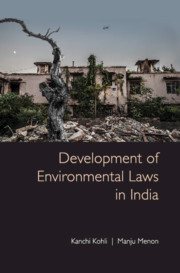Book contents
- Frontmatter
- Contents
- List of Tables
- Preface
- Acknowledgements
- Introduction: Environmental Laws and Development in India
- 1 Fundamentals of Environmental Law
- 2 Institutions Regulating India’s Environment
- 3 Forest Reservation and Conservation
- 4 Pollution Control and Prevention
- 5 Environmental Protection
- 6 Wildlife and Biodiversity Conservation
- 7 Ground and Surface Water Extraction
- 8 Land Acquisition
- 9 Climate Litigation and Policy Frameworks
- 10 Contemporary Environmental Law Reforms
- Index of Laws, Legal Cases and Government and Parliamentary Committee Reports
- General Index
9 - Climate Litigation and Policy Frameworks
Published online by Cambridge University Press: 31 July 2021
- Frontmatter
- Contents
- List of Tables
- Preface
- Acknowledgements
- Introduction: Environmental Laws and Development in India
- 1 Fundamentals of Environmental Law
- 2 Institutions Regulating India’s Environment
- 3 Forest Reservation and Conservation
- 4 Pollution Control and Prevention
- 5 Environmental Protection
- 6 Wildlife and Biodiversity Conservation
- 7 Ground and Surface Water Extraction
- 8 Land Acquisition
- 9 Climate Litigation and Policy Frameworks
- 10 Contemporary Environmental Law Reforms
- Index of Laws, Legal Cases and Government and Parliamentary Committee Reports
- General Index
Summary
INTRODUCTION
Climate change has emerged as the most pressing environmental concern of global, national and local significance. The main cause of climate change is greenhouse gases (GHGs) that include carbon dioxide, methane, nitrous oxide and fluorinated gases emitted from a variety of industrial processes. Carbon emissions from various industrial sectors form the largest percentage of GHGs. High levels of GHGs in the atmosphere create a gaseous blanket around the earth, packing in the earth's radiation and preventing the escape of heat. It also disrupts the earth's water and weather cycles that connect the oceans and land. Most parts of the world have witnessed unpredictable and intense weather events affecting food productivity, human health and wild biodiversity. This wide spectrum of effects is increasingly being linked to climate change. According to a 2019 assessment by Morgan Stanley, the global economic cost of climate disasters over three years was USD 650 billion. The high carbon-emitting economic activities also involve changes in local land use that cause deforestation, land degradation and environmental pollution.
The international discussions on global warming and climate change date back to the mid-1970s. However, it was only in 1988 that the Intergovernmental Panel on Climate Change (IPCC) was established under the aegis of the United Nations (UN) with the objective of collating scientific evidence related to climate change. The IPCC's first assessments in 1990 and 1992 presented conclusive evidence on rising temperature and attributed it to rising GHG emissions. Since then, the 1992 United Nations Framework Convention on Climate Change (UNFCCC) and the Kyoto Protocol (1997) have recognised ‘that developed countries are principally responsible for the current high levels of GHG emissions in the atmosphere as a result of more than 150 years of industrial activity’.
The UNFCCC is one of the three framework conventions of the Rio Earth Summit, the other two being the Convention on Biological Diversity and the UN Convention to Combat Desertification. These are elaborated in Chapter 1. The UNFCCC is the overarching international framework binding all its signatories, including India, to commit to a reduction in GHG emissions based on the principle of ‘common but differentiated responsibilities (CBDR)’. This principle was central to the discussions at the Earth Summit held in Rio de Janeiro in 1992.
- Type
- Chapter
- Information
- Development of Environmental Laws in India , pp. 299 - 318Publisher: Cambridge University PressPrint publication year: 2021



